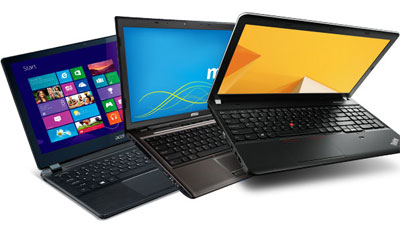
An important question that comes to mind when you are going to buy a laptop is what to look for when buying a laptop. This laptop buying guide will surely help you to consider some points before buying a laptop.
When compared to old times, laptops have become extremely affordable. Today, we can get mid-end laptops for half the price of a flagship smartphone – See Laptop vs Smartphone vs Tablet PC guide. Not just that, laptops are now available in varying sizes and budgets. And, what’s more, exclusive features are what make every laptop unique. Because of all these factors, most people have a hard time to find a suitable laptop for you. And, that’s why you surely need a laptop buying guide to get things done smoothly.
In today’s article, we shall have an in-depth guide for buying a laptop and how to pick the right laptop that is very well suited for your needs and that explores the answer to the question – what to look for when buying a Laptop?
We can give you a few effective tips on specifications for purchasing a laptop computer from trusted brands. Make sure you are following our tips and you can have the best laptop for your purpose. We have tried our best to cover all areas, but your comments are always welcome. We can cover the answers as per the most-asked ones. Shall we start, then?
Table of Contents
What to Look for When Buying a Laptop
1. Know your Purpose
A laptop is something that you would use for a long time, at least when compared to a smartphone. So, before you make a decision, you should be clear about the major purpose. For instance, you won’t need a MacBook Pro if you are just going to create some Documents or Browse Web. Likewise, a Pentium Dual Core PC won’t be enough if you are a video editor or need more system resources.
Before you stick onto the laptop brand and laptop, the purpose needs to be reassured. It’s based on the purpose that you will be purchasing the product. To make things simple, we can take an example. Suppose you are a student of Literature, about to join the college. In that situation, you will need a laptop that offers better speed, standard performance, and an ultra-portable design. If that’s the purpose, we would have suggested the MacBook Air, which is pretty much portable as well as user-friendly. On the other hand, when you are a student of Animation, you need a device with high-end graphics and processing speeds. The story goes on depending on your purpose.
So, we repeat, before you decide the brand, decide the purpose first and then you will get the answer to the question – What is kind of laptop Should I get? Then, you will know which brand is for you.
2. Your Budget, their Budget
We already told you that laptops are now available for different budgets. It does not matter whether you have $1000 or $500 with you, you can have a laptop for that price. It should be noted that the performance also varies according to your pricing range. So, before you go to the online store, you should have an idea about the expected budget. And, once you are in the store, this will make things quicker.

Another important thing about the budget is the persistence and adaptability. First of all, you should stick to the expected budget – keeping in mind your needs as well. For instance, for a mid-end laptop, you would not have to spend more than $600. On the other hand, for a graphics-rich, high-speed laptop, the pricing should be around $1000 or more than that. At the same time, you can adapt to the available deals. Suppose you are having a Dell XPS 13 Ultrabook for a better discount. In that case, considering it as a long-term investment, you can change the budget a bit.
Summing up things, budget plays an important role. You need to stick with it, but make certain changes when it profits you.
3. The Brand Matters
In case if you are wondering, let’s make that clear. A brand is an important factor when you are purchasing a new laptop or an old one, for that matter. We are not talking about brand addiction or the showing-off factor. But, there are a few things a laptop brand can tell you.

For instance, we can take the case of Apple. The brand is noted for user-friendly laptops that offer ultimate portability, easier UI, and other factors. Due to this, professionals who travel a lot tend to purchase laptops from Apple Inc. Similarly, if you are looking for an affordable set of laptops that can provide standard performance, ASUS is a better choice. There are many best Asus laptops you can consider if you are on a budget. In the same way, you can find different laptop brands that are suitable laptops. In one of our previous articles, we had covered the best laptop brands you can purchase devices from. If you are looking for a brand that suits your needs, you can check out that article for reference.
Therefore, when you are about to make the purchase, the brand should be a decision maker. Also, when you purchase laptops from a brand, you purchase the service as well. After-sale support is something important here. If you go for a brand that does not offer customer care and support, you will be in deep trouble. Taking reference from the previous article, Dell is a brand you can trust for on-time, quality-rich after-sale support and technical resolving.
4. Screen Size, the Weight and Portability
We already mentioned the portability factor above, but this one is a bit more important. Screen Size is one of the pivotal factors that decide the usability of the laptop you are buying. Here too, the primary concern is the nature of purpose.
Just think of the situation of a professional journalist. He or she will have to visit a lot of places and do some of the portable computing tasks. In that case, it is necessary to get a portable laptop with a lower screen size. For example, you can go with a 13-inch screen size or 14-inch. However, if you are going past the 15-inch limit, it won’t be travel-friendly. On the other hand, suppose you are setting up a laptop-based workstation at your home. Given that you don’t move the device much; it makes sense to purchase a device with the largest laptop screen. On an average, you can get something around 15 inches. So, you need to choose the screen size as per your need.
Another factor of concern is the weight of the device. You can have different laptops at different weights. Actually, the weight of the device is affected by many factors such as the battery size, screen size etc. For instance, if you are getting a battery life of 12 hours or so, the laptop can be quite heavy – Apple devices are an exception here. Similarly, most of the laptops with 15.6″+ devices have an average laptop weight of around 1.5 KGs. The more size you get, the heavier your laptop becomes. Also, weight varies according to the brand as well. It’s apparent that some laptop brands produce heavier laptops in comparison. These are the factors that determine the portability of your laptop you want to buy.

5. Traditional or Hybrid (Detachable Laptop)
Nowadays, you can find two major types of laptops in the market – traditional laptops and hybrid ones. Traditional laptops mean the common ones with connected display and normal viewing angles. However, Hybrid laptops or sometimes called detachable laptop can be used as a tablet PC at times, by detaching the keyboard (that’s the reason why hybrid laptops are called detachable laptop) or rotating the screen. The devices in the YOGA Series of Lenovo is the best example of hybrid convertibles. Depending on the purpose and situation, you can rotate the screen and choose the mode. For instance, you can turn it into the tablet PC mode and use the touchscreen, just as you are using a big-sized tablet PC. Subject to availability and pricing, this can be a good decision-making point in laptop purchase.
6. RAM vs Processor – The Two Pillars
These two are the most important sections of this guide on what to look for when buying a laptop. And, we should go in-detail about RAM vs Processor.
Processor
The Central Processing Unit – commonly referred to as the Processor – is what defines the speed and performance your laptop has. And, when it comes to the selection, you need to choose the best. As you know, different manufacturers use different processors in their devices. For instance, MacBook devices always come with a high-end Intel Core processor while we see AMD Processors in the gaming-oriented laptops often. Before the final selection, you should know about all.
For instance, if you are expecting the standard performance from the device, you can go with Intel i3 or i5 processors. On the other hand, if you are setting up a high-performance workstation or gaming laptop, you should prefer Core i7, which is performance-friendly and stable. There are other processors from AMD and the mid-end processors like Intel m3, m5, m7 etc. It needs to be noted that the processor also determines the battery life of your laptop. To take an example, m5-powered laptops are more battery-friendly.
In short, processor selection is subject to the performance you require.
RAM – How to Check How Much RAM you have
What does RAM stand for? RAM stands for Random Access Memory, which is a form of temporary memory for your laptop. So, if you run a lot of apps at a time, you need more RAM. Standard laptops come with 4 GB of RAM while the portable ones may go down to 2 GB. On the other hand, if we take the case of performance-based laptops like MacBook Pro, you will find around 8 GB of RAM or higher. The best part is that many laptops come with an additional RAM slot to attach an external RAM. If you find the existing RAM to be not-so-sufficient, you can simply upgrade it to external RAM that is also called a usable RAM.
Conclusively, RAM is a factor that determines your system speed, multi-tasking, and performance at once. That is, if you use a lot of Google Chrome tabs at once, it’s necessary to have around 8 GB of RAM.
7. Storage Space
Storage isn’t just about storage space. Laptops come in varying types of storage spaces. In most cases, you come across Hard Disk Drive storage, which is the traditional form. It offers standard speed, performance, and durability. However, in recent times, manufacturers have started using Solid State Drives for storage.
When compared to HDD, these are very performance-friendly and reliable. For instance, SSD storage is less vulnerable to physical damages and all. Also, it happens to have a positive impact on booting time and system performance. So, depending on the preference, you can pick one from the SSD vs HDD duo.
Talking of the storage, it’s your choice, actually. If you have a portable HDD with you, any type of storage is enough. You can even go with 128 GB SSD. This is an excellent choice if you are going with a mid-end Ultrabook with SSD storage. In the end, the selection is to be based on your needs.
8. Laptops with Good Battery Life
This should be a concern when you are buying a new laptop or a used laptop. Ultimately, battery life is for those who use laptops as laptops. That is, if you carry around your laptop for a long time and work outside, the battery life is like gold. In another scenario, if you are setting up a workspace at home, you can pick laptops with lower battery life. Now, let’s talk about some examples.

Apple laptops – let that be MacBook Air or MacBook Pro – have always been noted for revolutionary battery life. In the latest Air, for instance, you can get 12 hours of battery life. And, that’s one of the reasons why journalists and traveling-based professionals go for Apple. On the other hand, ASUS Ultrabooks are also offering more-than-standard battery life in their devices. Obviously, all these are life estimates and surely depends on your usage pattern and type. For instance, if you are into heavy games, you can’t think of a long battery life laptop, in any case.
Therefore, given that you know the purpose of a laptop, you can go for the battery life factor. In the end, you must not be complaining about it, especially when you are a professional.
9. Warranty and Support
In our article of the best laptop brands, we had mentioned some brands that offer top-notch technical support and onsite warranty. Dell was an example of that, as we recall. So, this is a bit more important when you are purchasing a laptop. It is necessary to make sure that the manufacturer is offering standard customer care and warranty with it. You can go on a laptop if it has a warranty of around 2 Years or 1 Year. But, the major factor is the support. It’s always good to go with on-site support because you can get the issues fixed from your home. Essentially, this is about the brand you rely on too.

10. The Miscellaneous Factors
And, we will just list out the other small but important factors that matter in our laptop buying guide.
- Platform: Depending on the purpose and stability, you can choose between Microsoft Windows, macOS, and the Chrome OS. Always try to get the latest version of the OS, due to obvious reasons. Alternatively, if you need the power of the open source, there are some Linux laptops that come with Ubuntu. So, the platform is essentially about your preference.
- Touch Screen: It’s another concern when you are purchasing a laptop. Most people are okay with laptops that do not have touchscreens. But, if you are expecting some extra usability perks, you can consider the touchscreen.
- Keyboard: Depending on the weight and screen size, the keyboard also varies in different laptops. If you type a lot, you should consider a full-sized keyboard with a numeric keypad. But, if it’s just about some Word documents and all, you can get on without the numeric keys.

- Display: This is optional, but if you are into much of visual-based performance, you need a High Definition display. Otherwise, it should be fine with QHD or industry standard. However, we have seen some professionals opting for Apple Retina Display, especially photographers.
- Connectivity: It’s not so important in the home-based workstation. However, in a portability-based purpose, you can consider having better connectivity options like Bluetooth and NFC – apart from the commonest Wi-Fi.
- Last but not least, Full System Check-Up is necessary when you are purchasing a used laptop machine. You have to check both the software and hardware sections and make sure it’s all working.
What to Look for When Buying a Laptop – Conclusion
So, we have covered a laptop specifications list that should be considered during laptop purchases. We have tried our best to make things clear, but you may have specific doubts too. In fact, our laptop buying guide is supposed to give you a proper idea about different factors that matter. For instance, you should now be caring about the portability and screen size than you talk about processing speeds and the display stuff.
As we said, you should be a bit more careful when you are purchasing second-hand laptops from customers. They might have taken the full juice out of the system and made it useless. So, before you pay money, you should run a full-system check-up for confirming things. But, if you ask us, we always prefer going for fresh laptops. With the right discount options and deals, you can get your hands on an impressive laptop – without a fancy budget. And, there are many cool budget-friendly laptops you’d find in the market.
In the end, we hope you understood what to look for when buying a laptop using our laptop buying guide.





More Stories
11+ Best ThePiratebay3 Sites – Ultimate Pirate bay Alternatives
7movierulz iBomma – 11 Best Alternatives to Download & Watch latest Telugu Movies
How to Spam a Phone Number (7 best apps & services) with call, texts to Get Revenge?